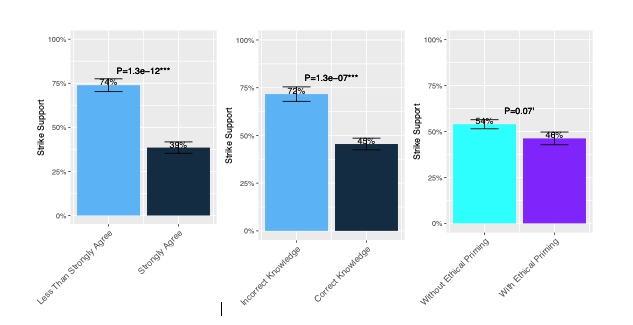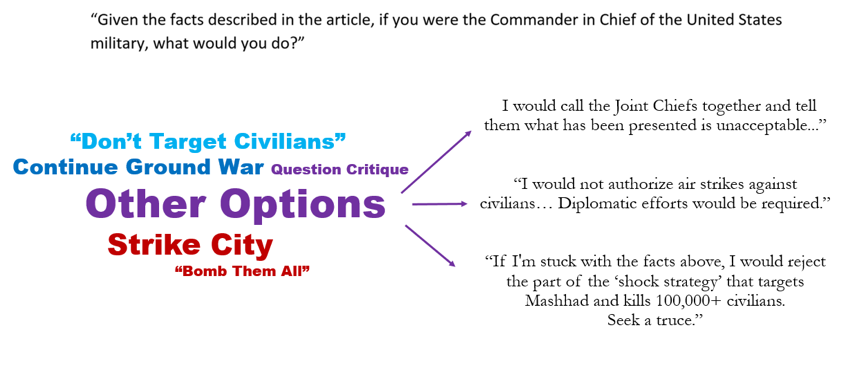
Photo by mostafa meraji on Unsplash
If the US went to war with Iran, would Americans support targeting enemy civilians if the war went poorly, as the US did during World War II? Would they support the use of nuclear weapons in such a war, or in a strike against North Korea?
Some recent studies say yes. Based on a survey about an imaginary war with Iran, scholars Scott Sagan and Ben Valentino concluded in 2017 that Americans accepted targeting civilian populations, even with nuclear weapons, if it would save troops’ lives by ending the war sooner. Their team published a new study this week on North Korea, arguing it confirmed their earlier finding: “As we have previously found,” they stated, “the U.S. public exhibits only limited aversion to nuclear weapons and a shocking willingness to support the killing of enemy civilians.”
These studies, however, are very limited: they were designed only to measure US public opinion on a restricted set of offensive options under crisis or wartime conditions, while omitting any mention of the ethical or legal ramifications of attacking civilians. We replicated that Iran study and added in some actual measures for knowledge of and sensitivity to the laws of war. Our research shows a heartening respect for the Geneva Conventions among a majority of Americans, and a greatly reduced support for civilian targeting among those exposed to ethical and legal arguments. Moreover, when we allowed respondents to say what they really thought about the fictional war scenario in Iran, instead of forcing them to choose between two unacceptable options, we found American attitudes be quite morally nuanced.
How we did our research
Using the same 2017 research design on Iran as Sagan and Valentino, we surveyed 2,500 Americans through YouGov—a global opinion and polling company. Each person read a fictional news story and was asked whether they prefer launching a strike against an Iranian city that would kill 100,000 civilians or continuing a costly ground war that would kill 20,000 US troops.
In one sample, we replicated Sagan and Valentino’s wording question exactly, forcing respondents to answer one way or the other with no middle ground and with no prior knowledge or information about whether this attack would be illegal.
But in some samples, we asked them whether they thought it was legal to intentionally and directly attack the civilian population in war. We also provided information to some but not all samples about the actual legality of saturation bombing civilians (spoiler alert: it’s always illegal). in others, we asked them not about law but about morality: regardless of what they knew about the law, how strongly they agreed with the statement “It is wrong to intentionally and directly attack the civilian population in war.”
Finally, we asked one subsample what they would do given the fictional scenario if they were President, allowing them to answer in any way they chose rather than restricting them to two unappealing choices. Here’s what we found.
Americans care deeply about the civilian immunity norm and Geneva Conventions
First, most Americans (80%) understand that targeting civilians is a war crime absolutely prohibited by international law—something earlier studies have rarely tested. And, this matters: 72% of those who got this question wrong preferred to strike the city, whereas only 45% of those who knew it was illegal chose that option.
Second, regardless of whether they knew it is illegal, respondents who believed that it is wrong to target civilians were much less likely to support saturation bombing. In our survey, about 80% somewhat or strongly agreed with the statement that it is “always wrong” to target civilians: only about 10% disagreed and 10% were “not sure” when asked prior to the survey question. This matters too: those that strongly agreed with this moral principle were much less likely to support saturation bombing.
Here’s the best part: we also found that even just thinking about the immunity norm prior to expressing a preference makes a difference in expressed preferences, reducing support for war crimes. When asked about the ethics of civilian targeting in the abstract first—regardless of whether they agreed it was wrong—support for the strike dropped to below half (46%). So, even if people don’t personally think it’s wrong, and don’t understand the law, just hearing people ask them questions about law and ethics, or hearing ethical concerns mentioned (say, over dinner with friends) might sway them against war crimes.
 Figure 1: Support for Strike Drops With Law Knowledge, Ethical Agreement, or Normative Priming
Figure 1: Support for Strike Drops With Law Knowledge, Ethical Agreement, or Normative Priming
Americans care about civilians, but polls can trick them into saying otherwise
Americans clearly care about civilians. This demonstrated not only in other surveys and fictional experiments of this type but in audience reactions to fictional war crimes on television. So what explains Sagan and Valentino’s results on Iran and North Korea? One possibility is the structure of the survey questions, which research by Sarah Kreps and by Alexandria Nylen shows can have an important impact on human rights poll results. For example, we think forcing respondents to lean one way or another may have exaggerated support for war crimes in the original study by discounting the wide number of Americans who rejected both options.
Consider: 57% of Americans in our study leaned toward striking the city when forced to choose on a six-point scale between “CONTINUE GROUND WAR” and “STRIKE.” But this percentage dropped to 34% when we asked respondents in one group to just tell us what they would do if they were the President. Nearly half of these respondents refused both options in the news article, suggesting a range of alternatives: withdraw, negotiate, use airstrikes but only against military targets, or “never get into a war with Iran in the first place.” The number of Americans specifically stating “Don’t Target Civilians” greatly outweighed the tiny minority who exhibited a “Bomb Them All” attitude.

Figure 2: Tag Cloud of Comment Codes from Open-ended Answers to Iran Scenario Question
What does this mean for a real-life war in Iran or North Korea?
First, laws and norms do matter to Americans—but they are likeliest to influence citizen attitudes when they are part of the political conversation. We found the law mattered or those who knew it, agreed with it, or were asked to think about it. In Sagan and Valentino’s original fictional news story on Iran, as well as their new follow-up study on North Korea, there was no mention of the Geneva Conventions before Americans were invited to express a preference for a war crime. This may have encouraged respondents to discount international law and morality.
Fortunately, in the real world there would not be such an information vacuum. Any public debate on bombing civilians today would include talk of international law and morality by an array of actors: political elites, many NGOs, and a number of important international organizations. And survey experiments show Americans trust what they hear from these actors. So in a real-life scenario such as this, a majority would likely oppose such a bombing. And if there’s any key lesson from both the Stanford/Dartmouth study and ours, it’s that we need more education on the Geneva Conventions.
Second, we should be cautious of making inferences about American attitudes on war from surveys that fail to mention civilians, or prime respondents to think in black and white. Our study confirms findings from other recent studies: when you mention civilian deaths, Americans overwhelmingly oppose military action. But push-pollsters interested in drumming up support for war crimes can easily manipulate responses do the opposite. The informed public and foreign policy analysts should be on the alert for such skewed polls, or for suggestions that bombing civilians is a legitimate policy option.
Even if it could end a war (and it can’t), targeting a civilian city is illegal and should never be on the table. Were it considered, the President would face opposition by Americans, no matter what some polls say. And that’s a good thing.
